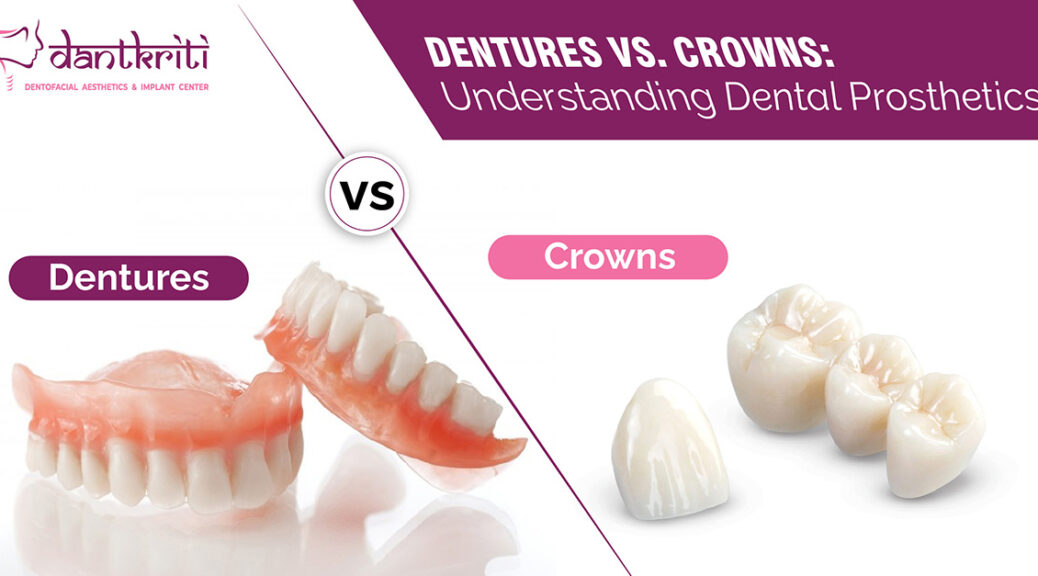
Dentures vs. Crowns: Understanding Dental Prosthetics
When restoring missing or damaged teeth, dental prosthetics play a crucial role in improving oral function and enhancing the aesthetics of your smile. Two commonly used dental prosthetics are dentures and crowns. Dentures are removable appliances that replace multiple missing teeth, while crowns are fixed restorations that cover and protect individual damaged teeth.
Dentures: Replacing Multiple Missing Teeth
Dentures are custom-made removable appliances that are designed to replace multiple missing teeth. They consist of artificial teeth set into a gum-coloured base that rests on the gums and may be held in place with clasps or adhesives. Dentures are classified into two main types: complete dentures and partial dentures.
Complete Dentures: Complete dentures are used when all the teeth in an arch (upper or lower jaw) are missing. They are composed of a complete set of artificial teeth attached to a flesh-coloured acrylic base. Complete dentures rely on suction, saliva, and muscle control to stay in place.
Partial Dentures: Partial dentures are used when some natural teeth remain in the arch. They consist of artificial teeth attached to a metal or acrylic framework that clasps onto the existing teeth for stability. Partial dentures replace missing teeth and help prevent the remaining natural teeth from shifting.
Benefits of Dentures:
Restoring Chewing Function: Dentures enable individuals with missing teeth to chew and eat various foods, improving their ability to maintain a nutritious diet.
Enhanced Aesthetics: Dentures are designed to resemble natural teeth, enhancing the appearance of your smile and boosting your self-confidence.
Non-Invasive Treatment: Dentures do not require surgical procedures or existing teeth alterations. They offer a non-invasive solution for replacing missing teeth.
Cost-Effective: Dentures are generally more cost-effective than other dental prosthetics. They provide an accessible option for individuals with budget constraints.
Crowns: Protecting and Restoring Individual Teeth
Crowns, also known as dental caps, are fixed restorations that cover and protect individuals with damaged or weakened teeth. Crowns are typically recommended in the following situations:
Tooth Decay: When a tooth is severely decayed or structurally compromised, a crown can restore its strength, functionality, and appearance.
Fractured or Broken Teeth: Teeth that have suffered significant fractures or breaks can be reinforced and protected with crowns, preventing further damage.
Root Canal Treated Teeth: A tooth may become brittle and prone to fractures after undergoing root canal treatment. A crown is often placed to strengthen and protect the tooth.
Misshapen or Discolored Teeth: Crowns can also improve the appearance of misshapen or discoloured teeth, providing a more uniform and aesthetically pleasing smile.
Benefits of Crowns:
Tooth Preservation: Crowns allow for preserving the natural tooth structure by covering and protecting the damaged tooth. It helps maintain the tooth’s integrity and avoids the need for extraction.
Strength and Durability: Crowns are made from durable materials, such as porcelain, ceramic, or metal alloys, that can withstand chewing and biting, providing long-lasting strength and protection.
Natural Appearance: The crown materials can be customized to closely match the colour and clarity of your natural teeth, ensuring a seamless and natural-looking restoration.
Improved Function Improved Function: Crowns restore the functionality of damaged teeth, allowing for proper chewing, biting, and speaking. They help maintain proper occlusion and prevent further deterioration of the tooth.
Long-Term Solution: With proper care and maintenance, crowns can last for many years, providing a reliable and long-term solution for damaged or weakened teeth.
Factors to Consider When Choosing Between Dentures and Crowns:
Several Missing Teeth: Dentures may be the appropriate choice if you have multiple missing teeth in an arch. However, crowns can provide a more targeted and precise restoration if you have only one or a few damaged or missing teeth.
Oral Health Condition: The overall condition of your oral health is a crucial factor to consider. If you have significant gum disease, bone loss, or untreated dental issues, these factors may affect the success and longevity of dentures or crowns. Your dentist will assess your oral health and recommend the most suitable treatment.
Maintenance and Care: Dentures and crowns require different maintenance routines. Dentures need to be removed and cleaned regularly, while crowns can be cared for like natural teeth with regular brushing, flossing, and dental check-ups.
Consultation with your dentist is crucial for determining the most appropriate dental prosthetic. They will evaluate your oral health, discuss your goals, and provide personalized recommendations based on your circumstances.